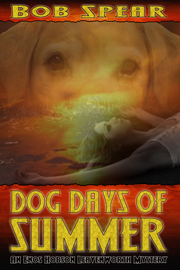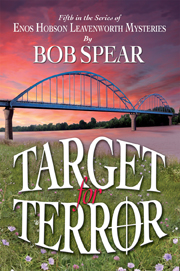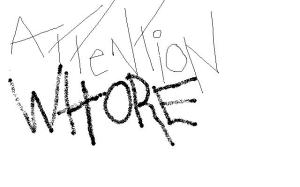Here’s everything I know about improving your writing, publishing it electronically and in print, and promoting it after the sale.
Two questions you should ask:
1. What will it cost me?
2. What does this Michael LaRocca guy know about it?
Answer #1 — It won’t cost you a thing. The single most important bit of advice I can give you, and I say it often, is don’t pay for publication.
My successes have come from investing time. Some of it was well spent, but most of it was wasted. It costs me nothing to share what I’ve learned. It costs you nothing to read it except some of your time.
Answer #2 — “Michael LaRocca has been researching the publishing field for over 10 years.”
This quote from Authors Wordsmith was a kind way of saying I’ve received hundreds of rejections. Also, my “research” required 20 years.
But in my “breakout” year (2000), I finished writing four books and scheduled them all for publication in 2001. I also began editing for one of my publishers, a job I’ve been enjoying ever since.
After my first book was published, both my publishers closed. Two weeks and three publishers later, I was back on track.
See how much faster it was the second time around? That’s because I learned a lot.
Also, I found more editing jobs. That’s what I do when I’m not writing, doing legal transcription, or doing English consulting work in Thailand (my new home). But the thing is, if I’d become an editor before learning how to write, I’d have stunk.
I’ll tell you what’s missing from this monologue. What to write about, where I get my ideas from, stuff like that. Maybe I don’t answer this question because I think you should do it your way, not mine. Or maybe because I don’t know how I do it. Or maybe both. Once you’ve done your writing, this essay should help you with the other stuff involved in being a writer. Writing involves wearing at least four different hats. Writer, editor, publication seeker, post-sale self-promoter.
Here’s what I can tell you about my writing.
Sometimes an idea just comes to me out of nowhere and refuses to leave me alone until I write about it. So, I do.
And, whenever I read a book that really fires me up, I think, “I wish I could write like that.” So, I just keep trying. I’ll never write THE best, but I’ll always write MY best. And get better every time. That’s the “secret” of the writing “business,” same as any other business. Always deliver the goods.
I read voraciously, a habit I recommend to any author who doesn’t already have it. You’ll subconsciously pick up on what does and doesn’t work. Characterization, dialogue, pacing, plot, story, setting, description, etc. But more importantly, someone who doesn’t enjoy reading will never write something that someone else will enjoy reading.
I don’t write “for the market.” I know I can’t, so I just write for me and then try to find readers who like what I like. I’m not trying to whip up the next bestseller and get rich. Not that I’d complain. But I have to write what’s in my heart, then find a market later. It makes marketing a challenge at times, but I wouldn’t have it any other way.
When you write, be a dreamer. Go nuts. Know that you’re writing pure gold. That fire is why we write.
An author I greatly admire, Kurt Vonnegut, sweated out each individual sentence. He wrote it, rewrote it, and didn’t leave it alone until it was perfect. Then he wrote the next sentence the same way, etc., and when he reached the end of the book, it was done.
But I doubt most of us write like that. I don’t. I let it fly as fast as my fingers can move across the paper or keyboard, rushing to capture my ideas before they get away. Later, I change and shuffle and slice.
James Michener writes his last sentence first, then has his goal before him as he writes his way to it.
Then there’s me. No outline whatsoever. I create characters and conflict, spending weeks and months on that task, until the first chapter leaves me wondering “How will this end?” Then my characters take over, and I’m as surprised as the reader when I finish my story.
Some authors set aside a certain number of hours every day for writing, or a certain number of words. In short, a writing schedule.
Then there’s me. No writing for three or six months, then a flurry of activity where I forget to eat, sleep, bathe, change the cat’s litter… I’m a walking stereotype. To assuage the guilt, I tell myself that my unconscious is hard at work. As Hemingway would say, long periods of thinking and short periods of writing.
I’ve shown you the extremes in writing styles. I think most authors fall in the middle somewhere. But my point is, find out what works for you. You can read about how other writers do it, and if that works for you, great. But in the end, find your own way. That’s what writers do.
Just don’t do it halfway.
If you’re doing what I do, writing a story that entertains and moves you, you’ll find readers who share your tastes. For some of us that means a niche market and for others it means regular appearances on the bestseller list.
Writing is a calling, but publishing is a business. Remember that AFTER you’ve written your manuscript. Not during.
I’ve told you how I write. For me.
Editing
The next step is self-editing. Fixing the mistakes I made in my rush to write it before my Muse took a holiday. Several rewrites. Running through it repeatedly with a fine-toothed comb and eliminating clichés like “fine-toothed comb.”
Then what?
There are stories that get rejected because the potential publisher hates them, or feels they won’t sell (as if he knows), but more are shot down for other reasons. Stilted dialogue. Boring descriptions. Weak characters. Underdeveloped story. Unbelievable or inconsistent plot. Sloppy writing.
That’s what you have to fix.
I started by using free online creative writing workshops. What I needed most was input from strangers. After all, once you’re published, your readers will be strangers. Every publisher or agent you submit to will be a stranger. What will they think? I always get too close to my writing to answer that. So do you.
Whenever I got some advice, I considered it. Some I just threw out as wrong, or because I couldn’t make the changes without abandoning part of what made the story special to me. Some I embraced. But the point is, I decided. It’s my writing. My name on the spine, not yours, and I want people reading it centuries after I die. Aim high.
After a time, I didn’t feel the need for the workshops anymore. I’m fortunate enough to have a wife whose advice I will always treasure, and after a while that was all I needed. But early on, it would’ve been unfair to ask her to read my drivel. (I did anyway, but she married me in spite of it.)
Your goal when you self-edit is to get your book as close to “ready to read” as you possibly can. Do not be lazy and do not rush. You want your editor to find what you overlooked, not what you didn’t know about, and you want it to be easy for him/her. EASY! Easy to edit, easy to read. It’s a novel, not a blog.
Your story is your story. You write it from your heart, and when it looks like something you’d enjoy reading, you set out to find a publisher who shares your tastes. What you don’t want is for that first reader to lose sight of what makes your story special because you’ve bogged it down with silly mistakes.
Authors don’t pay to be published. They are paid for publication. Always. It’s just that simple. Publishers are paid by readers, not authors. That’s why they help you find those readers.
Your publisher should also give you some free editing. But there’s a limit to how much editing you can get without paying for it. Do you need more than that? I don’t know because I’ve never read your writing. But if you evaluate it honestly, I think you’ll know the answer.
As an editor, I’ve worked with some authors who simply couldn’t self-edit. Non-native English speakers, diagnosed dyslexics, blind authors, guys who slept through English class, whatever. To them, paying for editing was an option. This isn’t paying for publication. This is paying for a service, training. Just like paying to take a Creative Writing class at the local community college.
By the way, I don’t believe creativity can be taught. Writing, certainly. I took a Creative Writing class in high school, free, and treasure what I can remember of the experience. (It’s been a while.) But I already had the creativity, or else it would’ve been a waste of the teacher’s time and mine. (Later I taught Creative Writing in China. We call this irony.)
If you hire an editor worthy of the name, you should learn from that editor how to self-edit in the future. In my case it took two tries, because my first “editor” was a rip-off artist charging over ten times market value for incomplete advice.
That editor, incidentally, is named Edit Ink, and they’re listed on many “scam warning” sites. They take kickbacks from every fake agent who sends them a client. Avoid such places at all costs, and I will stress the word “costs.” Ouch!
If you choose to hire an editor, check price and reputation. For a ballpark figure, I charge a penny a word. Consider that you might never make enough selling your books to get back what you pay that editor. Do you care? That’s your decision.
Your first, most important step on the road to publication is to make your writing the best it can be.
Publication
My goal is to be published in both mediums, ebook and print. There are some readers who prefer ebooks, and some who prefer print books. The latter group is larger, but those publishers are harder to sell your writing to. I want to be published in both mediums, because I want all the readers I can get.
Before you epublish, check the contract to be sure you can publish the EDITED work in print later. I’m aware of only one e-publisher whose contract specified “no,” but my information on this is very much out of date.
Also, you might want to make sure your targeted print publisher will accept something that’s been previously published electronically. That’s a nasty little change that’s taken place over the past few years. Will I have to choose between the “big publishers” and epublication? I shouldn’t be forced to, but it’s possible. Check on this with someone more knowledgeable than I am.
If you know your book just plain won’t ever make it into traditional print, print-on-demand (POD) is an option. Some of my books fall into this category. The best epublishers will simultaneously publish your work electronically and in POD format, at no cost to you.
A lot of authors swear by self-publication, but the prospect just plain scares me. All that promo, all that self-editing, maybe driving around the countryside with a back seat full of books. I’m a writer, not a salesman. Maybe you’re different.
(And did I mention that I live in Thailand? And don’t have a car?)
I self-published once, in the pre-POD days. Mom handled the sales. I had fun and broke even. With POD, at least it’s easier (and probably cheaper) to self-publish than it was in 1989, because you’ll never get stuck with a large unsold inventory.
POD setup fees can range anywhere from US$100 to well over $1000. Don’t pay the higher price! Price shop. Also, remember that POD places publish any author who pays, giving them a real credibility problem with some reviewers and readers, and that they do no editing or marketing.
Closing Thoughts
Here’s something you’ve heard before. When your manuscript is rejected — and it will be — remember that you aren’t being rejected. Your manuscript is.
Did you ever hang up the phone on a telemarketer, delete spam, or close the door in the face of a salesman? Of course, and yet that salesman just moves on to the next potential customer. He knows you’re rejecting his product, not him.
Okay, in my case I’m rejecting both, but I’d never do that to an author. Neither will a publisher or an agent. All authors tell other authors not to take rejection personally, and yet we all do. Consider it a target to shoot for, then. Just keep submitting, and just keep writing.
The best way to cope with waiting times is to “submit and forget,” writing or editing other stuff while the time passes.
And finally, feel free to send an e-mail to me anytime. michaeledits@michaeledits.com. I’ll gladly share what I know with you, and it won’t cost you a cent.
I would wish you luck in your publishing endeavors, but I know there’s no luck involved. It’s all skill and diligence.
Congratulations on completing the course! No ceremonies, no degrees, and no diplomas. But on the bright side, no student loan to repay.








